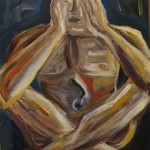
Willful Blindness is anything but. Margaret Heffernan, with eyes wide open, tells us the more we are willing to see, the more we become. In fact, long term health of the organization is directly related to leaders’ willingness and efforts to find their blind spots.
A few words of caution before you buy the book. Willful Blindness may bring about changes in the way think. It may explain phenomenon you’ve pondered, such as why we bury our heads in the sand. Reading it may reverse blindness and enable you to see what you have always known. If you read this book you may become more of who you are and, as a result, feel more fulfilled
In Willful Blindness Margaret Heffernan tackles a meta-problem – our innate tendency to see the clues and to simultaneously become blind to the pattern and meaningful story they present. The mere thought of ending this blindness leaves us in what seems a double bind. That bind, however, ends the moment we cross over and choose to see. Seeing brings both an enormous sense of freedom and a tremendous sense of accountability for resolving conditions that plague individuals, families, corporations, countries and our peaceful existence on the planet. We can no longer ignore a brother’s drug use, products known to fail and render harm, corporate lies, risk-laden investments, Ponzi schemes, genocide, global warming, and our own shadows. Seeing requires a choice to do something or to admit that we will do nothing, but we can no longer claim, “I did not know.”
As she lays out the factors contributing to blindness, and those needed to cure it, Heffernan leads us on a trail traversing the fields of law, social science, neuroscience, psychology, economics, literature and philosophy. Seeing through varied lenses of multiple disciplines is one of Heffernan’s suggested cures for willful blindness and she walks that talk in her book. She also reveals personal aspects of her own story, sharing the consequences of falling into blinding love, then making the choice to stay there. She admits that choosing to see would have been better.
If an author’s ability to engage the reader in conversation is the mark of a good book, Margaret Heffernan has written one. While reading I held imaginary discussions with Ms H. I posed questions instigated by her writing, suggested a different perspective, and asked why she let hubris off the hook so easily. I discussed the role of weak personal identity in turning a blind eye. With excitement, I told her that just prior to receiving her copy of Willful Blindness I read Sarah’s Key. It is a novelized account of actual events during World War II when the French government ordered police to round up and deliver Jewish families to the Nazis. Officials and police knew all the while that these Jewish mothers, fathers and their children would be tortured and murdered. It all took place in plain view of people who chose to be willfully blind. What if they had instead made the choice to see?
Heffernan points the reader to cures for blindness. Turning a blind eye is inherently human she claims, but leaders can institute practices, call on outsiders, and continuously increase the field of vision. She explores the attributes of those who choose to see – empathy and a genuine desire to see life through the eyes of the less privileged and more vulnerable. One of Heffernan’s characters realizes as a child that people don’t truly see his sister, who happens to have spina bifida. He wonders, “If they are missing her, what might I be missing when I see them?” He sees his own seeing and his blindness. See-ers seek to see more. They assume there is always something just outside their view and work hard to find it.
Hope lies within the pages of Willful Blindness if you are willing to see.
This book is on the short list of recommended reading for Germane Coaching & Consulting’s clients and all those who wish to see more.
You can order your copy by clicking the link below.

